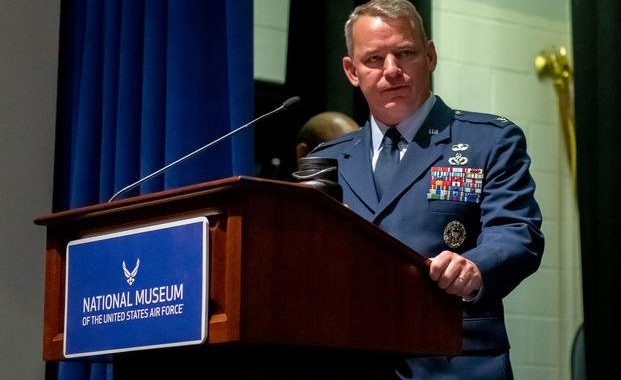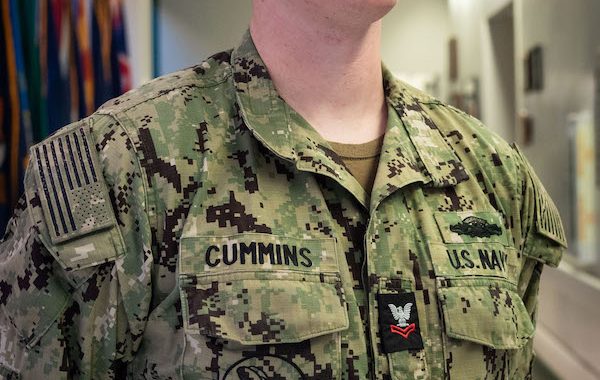Airmen receive valor medals for aid flights during Iranian missile attack in Iraq
3 min read
Brig. Gen. David Eaglin, commander of the 18th Wing, far left, poses with Maj. Grace Gibbens, left to right, Maj. Andrew Travis, Capt. Anthony Delgado and Tech. Sgt. Shelby Duncan at Kadena Air Base.
KADENA AIR BASE, Okinawa – Four airmen with Kadena’s 18th Wing received awards for valor earlier this month for their actions three years ago during an Iranian rocket attack on al Asad Air Base in Iraq.
Maj. Grace Gibbens, of Nashville, and Capt. Anthony Delgado, of Austin, Texas, received the Distinguished Flying Cross with a “V” device for valor on Feb. 8 during a ceremony inside the 33rd Rescue Squadron hangar. Maj. Andrew Travis, of Escondido, Calif., and Tech Sgt. Shelby Duncan, of Scottsbluff, Neb., received the Air Medal with a “V” device for valor at the same ceremony.
Delgado, Travis and Duncan now serve with the 33rd Rescue Squadron, 18th Wing spokesman Tech Sgt. Kyle Johnson told Stars and Stripes by phone Thursday. Gibbens is on the staff of wing commander Brig. Gen. David Eaglin, who presided over the ceremony.
“These young airmen did a fabulous job that was extremely heroic,” Eaglin said at the ceremony’s conclusion. “I’m proud of you, and I’m super glad I got the opportunity to hand these medals out to you.”
All four airmen were assigned to the 46th Expeditionary Rescue Squadron in Iraq as pilots or crew aboard HH-60G Pave Hawk helicopters that responded to Al Asad during a series of Iranian ballistic missile salvos on Jan. 8, 2020. The attack was retaliation for a U.S. drone strike five days earlier at Baghdad International Airport that killed Iranian Gen. Qassem Soleimani, head of that nation’s elite Quds Force.
No one was killed in the Iranian strike, but 110 service members suffered traumatic brain injuries. More than two dozen were later awarded the Purple Heart.
The Flying Cross is the fourth highest award for heroism and the highest for “extraordinary aerial achievement” that any member of the U.S. armed forces can receive, according to The Distinguished Flying Cross Society website.
The Air Medal is awarded for “single acts of heroism or meritorious achievements while participating in aerial flight,” according to the Air Force website.
‘Risky’ operation
On Jan. 7, 2020, Gibbens, a pilot, and her Pave Hawk, call sign Jolly 47, were on alert in the vicinity of the U.S. Embassy in Baghdad for the possible evacuation of embassy personnel, she said after the ceremony. She was joined by another Pave Hawk, Jolly 46.
According to her citation, Gibbens was low on fuel as she headed back to Al Asad under threat of an attack. She landed on a closed airfield, with base personnel sheltered in bunkers, performed a “risky” self-refueling and loaded her aircraft with medical equipment.
Delgado volunteered to fly the last Pave Hawk on base, Jolly 48, which had known navigation and flight control problems, his citation reads. With Travis as a co-pilot and Duncan as crew, he too refueled without base support and loaded his helicopter with medical supplies and equipment.
The three Pave Hawks evacuated to a remote desert landing zone to survive a potential barrage and then fly back to base and treat any wounded, Travis said. Jolly 48 left the base only minutes before the attack, Delgado’s citation reads.
Starting in the early morning of Jan. 8, the first wave of three to six missiles struck the base, Travis said.
“The sheer magnitude of what we saw, we were like, ‘There’s no way people don’t need immediate medical help,’” Gibbens recalled.
No hesitation
The three Pave Hawks rushed back to the base, Travis said. Within a mile of the base they were instructed to immediately turn away because a second wave of missiles was incoming. They were in that turn when the second barrage struck.
The missiles continued to fall for the next 2 ½ hours.
The Pave Hawks flew back to Al Asad to assess the damage, Travis said. They landed so their pararescue crews could coordinate with forces on the ground and render aid. They worked into the evening.
Seeing the base struck by missiles had a profound impact on the aircrews, Duncan said after the ceremony.
“I don’t think anybody hesitated at all; everybody just kind of jumped in the aircraft and did what they had to do,” she said. “We immediately wanted to take off and go back and start to help people.”





